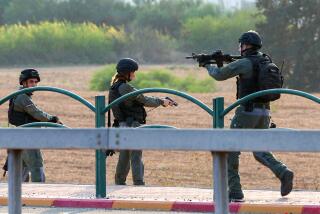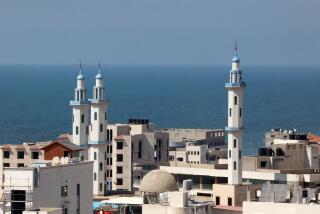NONFICTION - Nov. 22, 1992
- Share via
THE FIRE THIS TIME: U.S. War Crimes in the Gulf by Ramsey Clark (Thunder’s Mouth: $21.95; 325 pp.). THE PERSIAN GULF TV WAR by Douglas Kellner (Westview: $19.95; 460 pp.) While Ramsey Clark would like to deprive us of the military victory we have hungered for since World War II, he is not easy to dismiss. Hardly a knee-jerk activist who decided early on that Establishment politicians were evil, he was U.S. attorney general from 1961-1968 and head of the presidential delegation to Watts after the riots. Not an academic writing from the security of the ivory tower (like Douglas Kellner, a philosophy professor at the University of Texas), he risked his life by traveling for three weeks through Iraqi cities in an old American sedan at a time when the U.S. was staging 3,000 bombing sorties a day.
This is not to say that Ramsey Clark’s book, and to a greater extent, Douglas Kellner’s, are unimpeachable. Both suffer from the same weaknesses they denounce in the Establishment: Clark’s photo captions (e.g., “Children--the real victims of U.S. intervention”) often resemble American media propaganda, and Kellner can’t resist departing from his richly factual history to get in mean-spirited digs like this one: “Because the Bush Administration has a record of both incompetence and Machiavellian machinations...”
For the record:
12:00 a.m. Nov. 29, 1992 FOR THE RECORD
Los Angeles Times Sunday November 29, 1992 Home Edition Book Review Page 15 Book Review Desk 1 inches; 22 words Type of Material: Correction
A typographical error in the Nov. 22 “In Brief” column extended Ramsey Clark’s term as U.S. Attorney General from 1961 to 1968. He served from 1966 to 1969.
Nevertheless, at least two of Clark and Kellner’s points, virtually ignored in the mainstream U.S. media, deserve a brief hearing here: Only a tiny percentage of the 88,000 tons of bombs that rained on Iraq (the equivalent of seven Hiroshimas) were “smart.” After less than 24 hours in Basra, Clark reports, “we saw hundreds of buildings, whole blocks in 10 separate residential areas, hospitals, mosques, and churches damaged and destroyed.” Saddam’s invasion of Kuwait would never have occurred had there not been a long string of uninformed, insensitive Western diplomacy toward the region: from 1921, when Sir Percy Cox of the British Colonial Office separated Kuwait, originally part of the Basra province, from Iraq, prohibiting Iraq’s access to the Persian Gulf; to the mid-1980s, when the U.S. restored full diplomatic relations with Saddam while at the same time conspiring with Iran to overthrow him.
More to Read
Sign up for our Book Club newsletter
Get the latest news, events and more from the Los Angeles Times Book Club, and help us get L.A. reading and talking.
You may occasionally receive promotional content from the Los Angeles Times.








